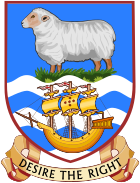Background
Under section 27 of the Falkland Islands Constitution, any change to the constituencies on the islands must be supported in a referendum by at least two-thirds of those who are registered as electors in each constituency. [5]
Elections in the Falkland Islands are held every four years to elect eight members to the Legislative Assembly using multiple non-transferable vote. The Camp constituency is currently heavily over-represented in the Legislative Assembly, electing three of the eight seats (38% of the total) with the remaining five seats being elected from the Stanley constituency (62.5%). However, according to the 2016 census, 87% of the islands' population live in Stanley, compared to 13% in Camp. [6]
It is the third time in 18 years that the Falkland Islanders were asked to vote on creating a single constituency for the whole of the Islands. The first referendum was held on 22 November 2001, to coincide with that year's general election, and asked "Do you agree that there should be a single constituency for the Falkland Islands, with a new voting system for proportional representation?". This was rejected by 56.65% to 43.35% overall and there were majorities against in both constituencies, with the 'No' vote in Camp being over 70%. [7]
Another referendum was held ten years later on 3 November 2011, but this time only asked voters if they wanted a single constituency and did not include provisions for changing the voting system. The question was again rejected, this time by 58.78% to 41.22% overall. A narrow majority of voters in Stanley (50.2% to 49.8%) voted in favour but over 80% in Camp voted against. [8]
In August 2018 the Falkland Islands Government announced that another referendum on creating a single constituency would be held on 7 November 2019. [9] However, on 24 July 2019 the Executive Council of the Falkland Islands agreed that polling day should be moved to 26 March 2020 [2] and then in March 2020, polling day was pushed back to 24 September 2020 owing to the coronavirus pandemic. The original date of November 2019 was chosen to allow sufficient preparation time for the referendum and also (in the event the referendum question is approved) have enough time to make appropriate amendments to the Electoral Ordinance and Constitution before the next election, expected to take place in November 2021. [9]
This page is based on this
Wikipedia article Text is available under the
CC BY-SA 4.0 license; additional terms may apply.
Images, videos and audio are available under their respective licenses.
